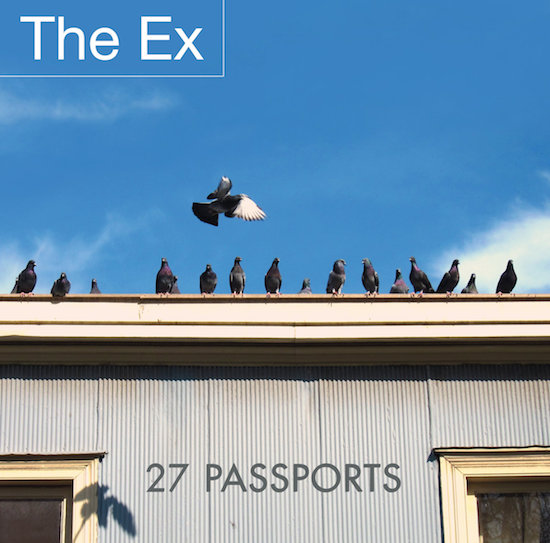What to say of The Ex that hasn’t been said already? I could be the perfunctory rock critic and say that their twenty-somethingth LP, 27 Passports, is possibly their most accomplished to date; still brimful of ideas and wisdom and still spitting out enough attitude and trickery to last most bands a career. But I would rather go deeper, sillier, giddier in my take. Outside of the fact that they continue to get better and better, we could maybe point to their inherent spiritual power, which is revealed in all its glory on this release.
The Ex, you see, are potent. Essential. A humane textbook on life itself, served up as a rock band. They are an act that in many ways, and over many years, encapsulate the way we lead our lives, throwing a compassionate, quizzical focus on both the quotidian minutiae and the huge, often unseen sonic shifts that eventually affect us all. We can’t escape The Ex because we can’t escape what they make music about. The artwork of the new record is prescient in this respect. The band – courtesy of guitarist Andy Moor’s photos – show us two symbols of our transient, interconnected, worldwide lives; that most ubiquitous of modern birds, the pigeon and an item we humans could not do without, even if we don’t know it; the shipping crate. Both reflect our imprint on the world. Both symbolise and reflect on the transient but ever-present, “humane” nature of The Ex’s music.
Without sounding like I’ve been on the ’erb, or communing Macca-style with the tawny owl in the woods across from my manor, I would also say that this record is proof that The Ex are inhabiting a headspace not far removed from Can in the 1970s. The first five tracks, courtesy of their hypnotically rhythmic nature and the brilliant lyrics, hammering into your consciousness over and over again like a six-inch flat top nail, send the listener into a reverie that feels very similar to the experience conjured by Tago Mago or Monster Movie. I’m not saying this record sounds like primetime Can. What I am trying to say is that The Ex’s spiritual otherness, their ‘rock as chamber music’ approach, how they seem to transmit from another plane, really feels like it could be Can. Both bands seem to inhabit outer space and maintain extreme, worldly focus.
Of course the sound of The Ex is – maybe through its down-to-earth nature and workaday trust in the benefits of both experiment and repetition – unique. And with the bruising instrumental, ‘Footfall’ or the growling lecture ‘Piecemeal’, you really get an inside view on how the band interlock. You see that the band cruise over the desert wastes like some trusty old Jalopy – long serviced, still able to shift gears and trust in ingenious, if not readily apparent technical about-turns and tweaks. But what is marked on 27 Passports is the brilliant marriage of the lyrics to the sound. The way ‘Soon All Cities’ erupts after De Boer sings “I can foresee that this town will go down / I can foresee that this town will drown” is a stunning payoff, for example. The lyrics are stunning; they quietly point to the fact that this band get around the world, meet people and see things. They have always had great, intelligent, giving lyrics, whether courtesy of original singer Jos or the ‘new’ frontman Arnold de Boer. But the way De Boer times his lines, the way tracks like ‘Soon All Cities’ or ‘Piecemeal’ divest their messages, slowly and with a hint of ingenue right up to the moment of reveal and sonic kick off, is wonderful.
We get tales of things, of elastic bands, shoes, apples, strange items like “the rod” in ‘The Heart Conductor’. A strange wisdom is at work, flexing its muscles on key track ‘This Car Is My Guest’. Here, a hoppity funk rhythm is fleshed out by some incredibly simpatico guitar patterns which lay the ground for an experience that is not short of mind-bending. The looseness and confidence is head-spinning, a mantra sans pareil. On this track and the follow-up, the seven-minute recycled leviathan that is ‘New Blank Document’, The Ex speak in tongues, ostensibly talking about car accidents and hard drives, but somehow not; somehow they encompass everything that’s going on. Every track deals with the little person and their struggles in the world, a focus on the small things, revealing a questioning spirit that is all-encompassing, quizzical and empathic. A world view, utterly without ego: there is not a trace of Apollonian rock god nonsense anywhere. “Smile and the world smiles with you.” Indeed.
The lack of Apollonian nonsense is hammered home with tracks like ‘Birth’, where drummer Kat lays down the law, and the righteous closer ‘Four Million Tulip Bulbs’, which deals with sorting tulips on an assembly line in a bollenfabriek somewhere in the north of the country: “It was the worst job I ever had”. As someone who packed bulbs for nigh-on a decade, I can empathise. And that’s the point. You can relate, throughout.
I know The Ex are often wrongly described as a “punk band”. I know it’s something that puzzles them, as they are equally in thrall to free jazz and the ever-giving sounds of Ethiopia and Ghana. But I wonder if the description is accurate, just this once. The music on 27 Passports is a sort of punk, played out as maybe the utopians in the original movement imagined it 40-odd years ago.


